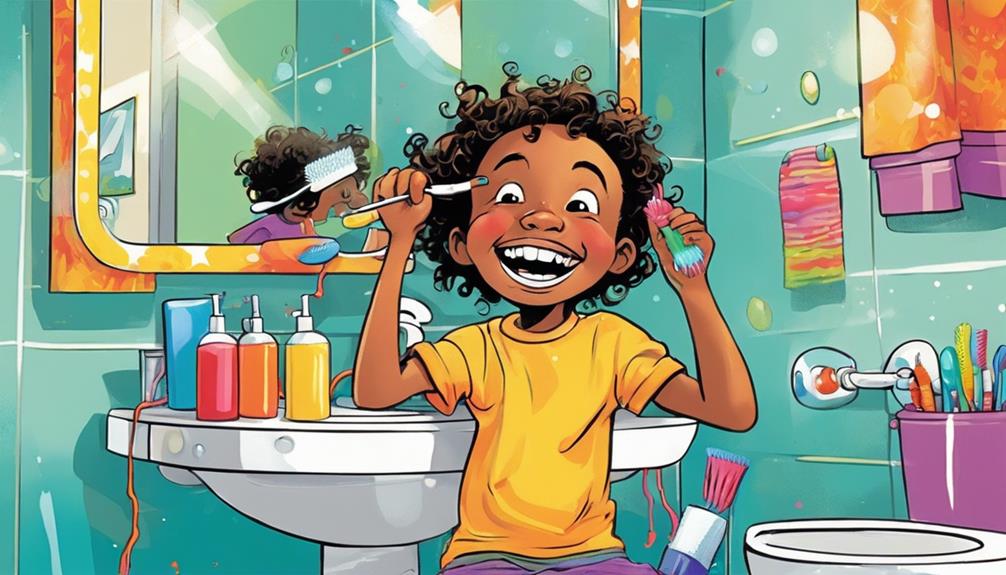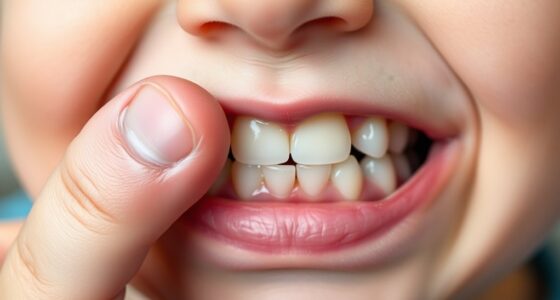To keep your child's breath fresh forever, you need to focus on solid oral hygiene and good dietary habits. Encourage them to brush twice a day and floss daily to remove plaque and food particles. Make sure they stay hydrated, as proper hydration boosts saliva, which cleanses the mouth. Limit strong-smelling foods like garlic and onions, and opt for crunchy fruits and veggies that help clean teeth. Regular dental check-ups are essential to catch any underlying issues early. By establishing these practices now, you can set the stage for a future of fresh breath. You'll find even more helpful tips ahead.
Key Takeaways
- Encourage regular brushing twice a day and daily flossing to eliminate plaque and bacteria buildup.
- Maintain a balanced diet by limiting strong-smelling foods and sugary snacks that contribute to bad breath.
- Promote hydration to stimulate saliva production, which naturally cleanses the mouth and combats dry mouth.
- Schedule regular dental check-ups for professional cleanings and tailored oral hygiene education.
Understanding Bad Breath in Kids
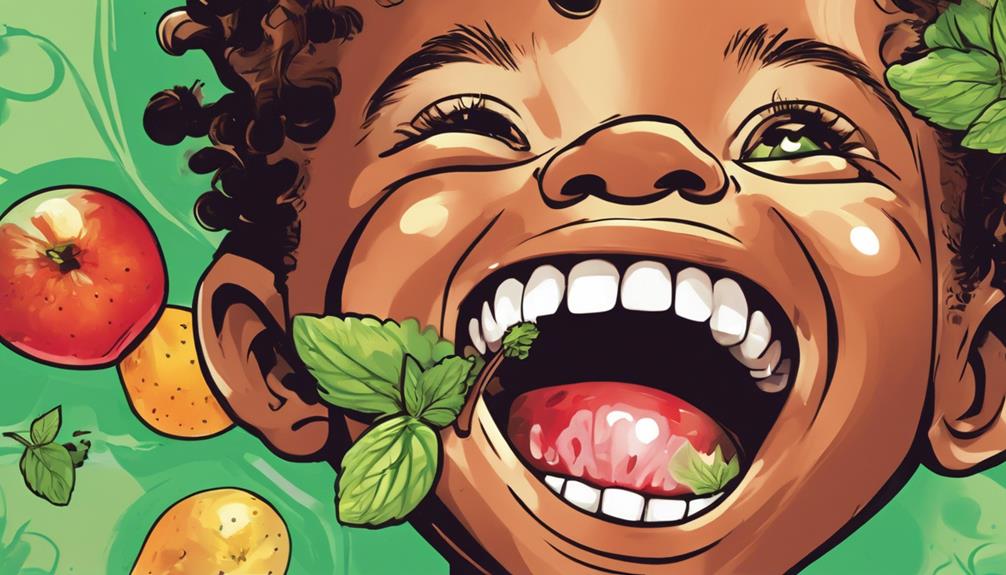
Bad breath, or halitosis, is a common issue in kids that often stems from poor oral hygiene practices. When children don't brush or floss regularly, plaque and bacteria build up in their mouths, leading to bad breath.
It's vital to understand that while strong-smelling foods like garlic and onions can cause temporary bad breath, the leading cause remains inadequate oral hygiene. You might notice that your child's breath smells off, which could be a sign that they're not cleaning their teeth effectively.
Encourage them to brush at least twice a day and floss daily. Also, remind them to scrape their tongues, as bacteria can linger there too.
Regular dental check-ups are important in identifying and addressing the root causes of bad breath. If bad breath persists despite good oral hygiene, it may signal underlying health issues that need attention.
Common Causes of Halitosis
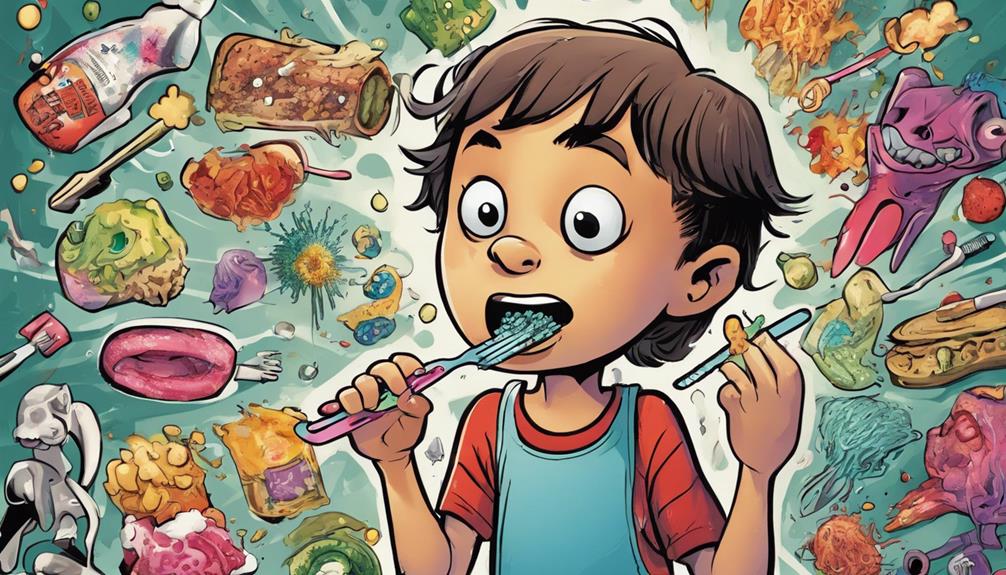
Halitosis in kids often arises from a combination of poor oral hygiene habits and certain lifestyle factors that can contribute to unpleasant odors in their mouths. Understanding these causes can help you take proactive steps to prevent bad breath.
| Causes of Halitosis | Description |
|---|---|
| Poor Oral Hygiene | Inadequate brushing and flossing lead to plaque buildup and bacteria. |
| Foods with Strong Odors | Foods like garlic and onions cause temporary bad breath due to lingering scents. |
| Mouth Breathing | Breathing through the mouth, especially at night, reduces saliva and promotes bacteria growth. |
| Medical Conditions | Conditions like sinus infections and tonsillitis can lead to persistent bad breath from mucus accumulation. |
Additionally, dietary habits play an essential role. High consumption of sugary and starchy foods can foster the growth of odor-causing bacteria. By addressing these common causes, you can help your child maintain fresh breath and improve their overall oral health.
Importance of Oral Hygiene
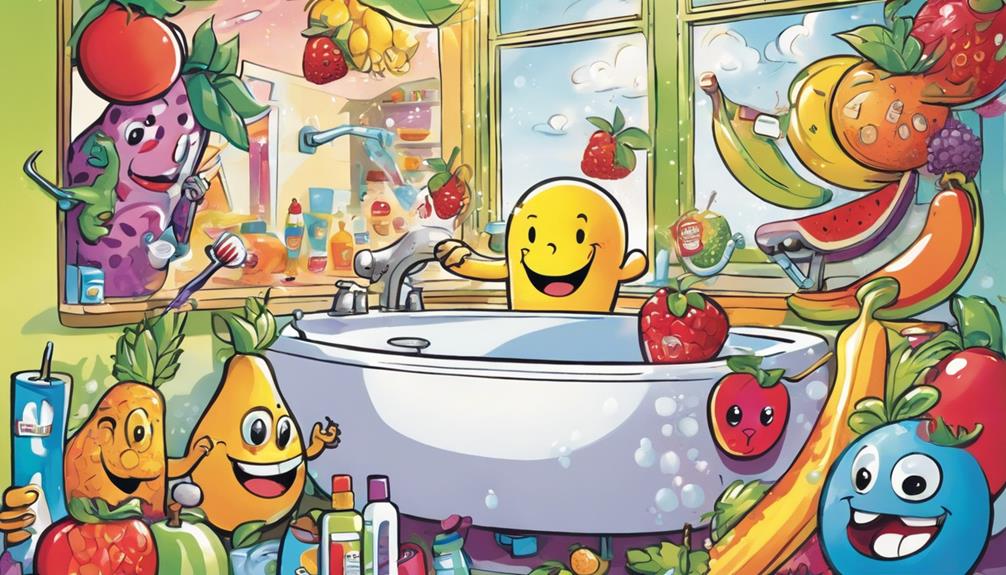
Maintaining good oral hygiene is vital for preventing foul odors and guaranteeing your child's overall dental health. Poor oral hygiene is a leading cause of bad breath in kids, as it allows bacteria and food particles to accumulate.
Here are some key practices to establish:
- Brush Twice Daily: Encourage your child to brush their teeth for at least two minutes, twice a day. This reduces bacteria and plaque buildup.
- Floss Regularly: Teach your child the importance of flossing daily. It helps remove food particles stuck between teeth that brushing might miss.
- Supervise Brushing: Until your child develops the necessary motor skills around age 7 or 8, make sure to supervise their brushing technique to confirm they're doing it effectively.
- Schedule Regular Dental Checkups: Regular visits to the dentist for professional cleanings and hygiene instruction are essential. They can help identify any underlying issues contributing to bad breath.
Dietary Impact on Breath

What your child eats plays a big role in their breath.
Foods like garlic and onions can linger long after meals, while sugary snacks can encourage bacteria that cause odors.
Keeping your child hydrated and offering balanced nutrition can make a noticeable difference in their breath freshness.
Strong Odor Foods
Strong-smelling foods like garlic and onions can leave your child's breath unpleasantly odorous for hours, so it's important to contemplate their dietary choices. Foods that contribute to foul odor can linger long after mealtime, making an oral hygiene routine essential.
Here are some strong odor foods to watch out for:
- Garlic
- Onions
- Cheese
- Pastrami
These foods break down in the digestive system, releasing odor-causing compounds into the bloodstream, which affects breath for up to three days. Infrequent eating can worsen bad breath since fat breakdown releases unpleasant chemicals.
To combat this, encourage your child to eat crunchy fruits and vegetables like apples and carrots, which can help clean teeth and reduce the odor-causing bacteria in the mouth.
After consuming strong odor foods, make sure your child brushes their teeth and uses mouthwash to minimize any lingering effects. Keeping a consistent oral hygiene routine will greatly help in avoiding that foul odor and maintaining fresh breath.
Hydration Importance
Hydration plays a significant role in keeping your child's breath fresh by promoting saliva production, which helps wash away food particles and bacteria. Ensuring your child drinks enough water throughout the day can effectively prevent bad breath. When kids stay hydrated, they're less likely to experience dry mouth, a common culprit behind halitosis.
Here's a quick overview of how hydration impacts your child's oral health:
| Aspect | Importance | Tips for Implementation |
|---|---|---|
| Saliva Production | Helps cleanse the mouth | Encourage water after meals |
| Dry Mouth | Contributes to bad breath | Remind them to sip water regularly |
| Sugary Drinks | Promote bacterial growth | Limit sodas and juices |
| Overall Health | Prevents gum disease and decay | Offer water instead of sugary drinks |
Balanced Nutrition Choices
A balanced diet plays an essential role in maintaining your child's fresh breath by influencing the types of foods they eat and how those foods affect oral health. By incorporating nutritious options, you can help combat bad breath effectively.
Here are four dietary choices to take into account:
- Limit strong-smelling foods: Foods like garlic and onions can linger in your child's mouth, leading to persistent bad breath.
- Reduce sugary and starchy snacks: These can promote bacterial growth, increasing the risk of bad breath. Encourage healthier alternatives.
- Encourage crunchy fruits and vegetables: Apples and carrots can naturally clean teeth and stimulate saliva production, which helps neutralize odors.
- Promote hydration: Make certain your child drinks plenty of water throughout the day. Staying hydrated helps wash away food particles and bacteria, preventing dry mouth, a common contributor to bad breath.
Natural Remedies and Treatments
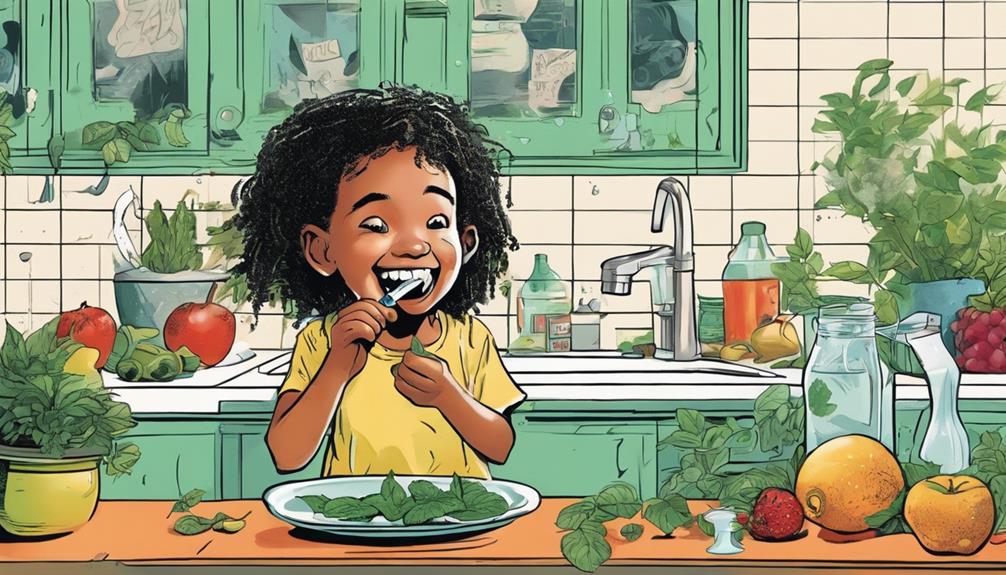
To tackle bad breath in kids, you can start by encouraging hydration to boost saliva production, which helps wash away food particles. Additionally, consider incorporating more fruits and vegetables into their diet, as the crunchier texture can help scrub away plaque and bacteria. Another helpful tactic is to teach them the benefits of tongue brushing for kids, as this can remove even more bacteria and debris from their mouths, leading to fresher breath overall. Making these small changes can make a big difference in combating bad breath in kids.
Dietary adjustments, like incorporating fresh herbs, can also make a big difference in freshness.
Plus, trying natural mouthwash solutions like baking soda and peppermint oil can effectively combat odors and bacteria.
Hydration and Saliva Production
Keeping kids well-hydrated is essential for maintaining healthy saliva production, which naturally combats bad breath by washing away food particles and bacteria.
When your child drinks enough water, it helps keep their mouth moist and reduces the risk of dry mouth, a common cause of halitosis. Saliva is vital for neutralizing acids produced by bacteria, making regular hydration a key component of oral health.
To encourage proper hydration, consider these tips:
- Set a drinking schedule: Remind your child to drink water at regular intervals throughout the day.
- Offer flavored water: Add slices of fruits like lemon or berries to make water more appealing.
- Hydrate after meals: Encourage your child to drink water after meals and snacks to wash away food particles.
- Make it fun: Use colorful cups or straws to make drinking water exciting.
Dietary Adjustments for Freshness
Healthy eating habits play an important role in maintaining fresh breath, so incorporating certain dietary adjustments can help combat bad breath in kids.
Start by adding crunchy fruits and vegetables, like apples and carrots, to their meals. These foods naturally clean teeth and stimulate saliva production, which is essential for oral hygiene and preventing bad breath.
Next, limit strong-smelling foods such as garlic and onions. Their lingering odors can greatly contribute to halitosis, so it's best to keep these to a minimum.
Encourage your kids to drink plenty of water throughout the day; staying hydrated helps maintain oral moisture and combat dry mouth, a common cause of bad breath.
Consider offering sugar-free gum containing xylitol as a snack option. This can freshen breath and promote saliva flow, which neutralizes odor-causing bacteria.
Finally, focus on a balanced diet rich in whole foods while minimizing sugary snacks. A healthy diet supports oral health and reduces the growth of bacteria that lead to bad breath.
Natural Mouthwash Solutions
Natural mouthwash solutions can effectively combat bad breath in kids by utilizing simple ingredients you likely have at home. By incorporating these natural remedies into their oral hygiene routine, you can help maintain fresh breath and promote better overall oral health.
Here are four easy natural mouthwash options:
- Baking Soda and Peppermint Oil: Mix a teaspoon of baking soda with a few drops of peppermint oil in water. This natural mouthwash helps neutralize odors and freshens breath.
- Apple Cider Vinegar and Honey: Combine one tablespoon of apple cider vinegar, one tablespoon of honey, and a cup of water. This mixture has antibacterial properties that combat odor-causing bacteria.
- Fresh Parsley or Mint Leaves: Encourage your kids to chew on fresh parsley or mint leaves. Their antibacterial properties can temporarily neutralize bad breath.
- Stay Hydrated: Regular water intake throughout the day keeps the mouth hydrated, reducing bad breath and preventing dry mouth.
Role of Regular Checkups
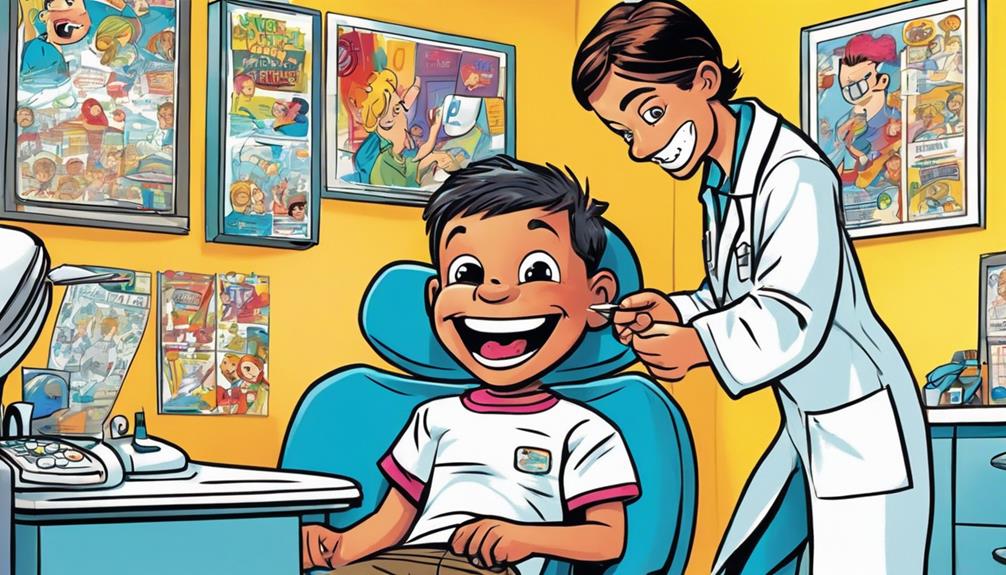
Regular dental check-ups play an essential role in preventing bad breath in kids by allowing for early detection of plaque buildup and cavities. When you schedule regular visits, you're ensuring that your child receives the care needed to maintain good oral hygiene. Pediatric dentists can pinpoint issues that might lead to halitosis in kids, addressing them before they become serious problems.
During these check-ups, your child will benefit from professional cleanings that eliminate odor-causing bacteria and food particles that brushing alone might miss. This not only helps in freshening their breath but also promotes overall dental health. Additionally, dentists provide tailored education, helping your child understand the importance of maintaining good oral hygiene habits.
Monitoring for underlying health issues, like gum disease or infections, is also vital. These conditions can contribute to persistent bad breath if left unchecked.
Establishing a consistent schedule for dental check-ups fosters lifelong oral health habits, greatly reducing the likelihood of bad breath as your child grows. Prioritizing these visits today can lead to a healthier, fresher tomorrow for your child.
Encouraging Healthy Habits
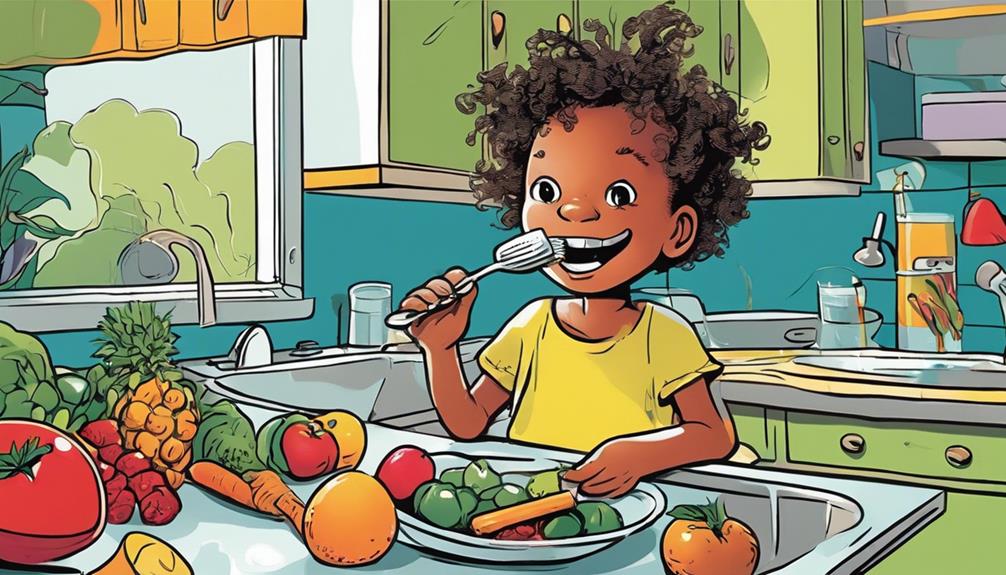
Building on the importance of dental check-ups, encouraging your child to adopt healthy oral hygiene habits at home is key to preventing bad breath. By instilling these practices early, you're setting them up for a lifetime of good oral health.
Here are four strategies to help your child develop healthy habits:
- Brushing Twice Daily: Make sure your child brushes their teeth twice a day for at least two minutes. This routine helps remove plaque and prevent bad breath.
- Flossing Daily: Teach them to floss once a day to clean between teeth, where toothbrushes can't reach. This is essential for maintaining fresh breath.
- Stay Hydrated: Encourage your child to drink plenty of water throughout the day. It keeps their mouth moist and helps fight off bad breath.
- Tongue Cleaning: Show your child how to clean their tongue or use a tongue scraper. This eliminates odor-causing bacteria that can linger and lead to bad breath.
When to Seek Professional Help

Knowing when to seek professional help for your child's bad breath can make a significant difference in addressing potential health issues. If your child's bad breath persists despite practicing good oral hygiene, it's time to visit the dentist. This could indicate underlying health problems that need attention.
Additionally, if your child experiences mouth pain, swollen gums, or fever along with bad breath, don't hesitate to schedule a dental appointment for a thorough examination. Regular dental check-ups are essential for early detection of issues like plaque buildup, cavities, or gum disease that can lead to bad breath.
If your child has a history of respiratory infections, sinus issues, or allergies and shows signs of bad breath, consult a healthcare provider to rule out any related medical conditions.
Also, keep an eye out for signs of foreign objects lodged in the nose, especially in toddlers. If you notice unusual nasal symptoms along with bad breath, pursue professional help immediately. Addressing these concerns promptly can lead to better health outcomes and guarantee your child enjoys fresh breath.
Frequently Asked Questions
Why Does My Child Have Bad Breath All the Time?
If your child has bad breath all the time, it might be due to poor oral hygiene, certain foods, or even underlying health issues. Consider checking their dental habits and consulting a healthcare professional for persistent concerns.
How Do You Fight Bad Breath in Kids?
To combat bad breath in kids, you'll want to arm them with healthy habits. Encourage regular brushing, flossing, and hydration. Limit smelly foods, schedule dental check-ups, and teach tongue cleaning for a fresher smile.
How Can I Stop Bad Breath Permanently?
To stop bad breath permanently, you should brush your teeth twice daily, floss regularly, and stay hydrated. Incorporate tongue scraping, maintain a balanced diet, and visit the dentist for check-ups to guarantee peak oral health.
Why Does My Child's Breath Smell Even After Brushing?
Imagine a treasure chest overflowing with hidden treats; that's how food particles can linger in your child's mouth. Even with brushing, these remnants can cause bad breath, making it essential to address tongue cleaning and hydration.
Does Rinsing with Salt Water Help in Avoiding Bad Breath in Kids Forever?
It is recommended that kids should rinse daily with salt water to help in avoiding bad breath. This simple practice can effectively kill bacteria and reduce the risk of developing halitosis. Rinsing with salt water can be a cost-effective and natural way to maintain good oral hygiene in children.
Conclusion
In conclusion, keeping your child's breath fresh isn't just about brushing—it's a combination of good habits and regular checkups.
Did you know that nearly 50% of kids experience bad breath at some point?
By prioritizing oral hygiene, understanding dietary impacts, and encouraging healthy habits, you can greatly reduce the chances of halitosis.
So, take these steps to guarantee your little one's smile stays bright and their breath stays fresh for years to come!
